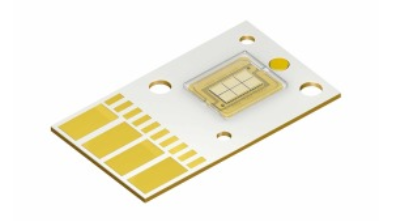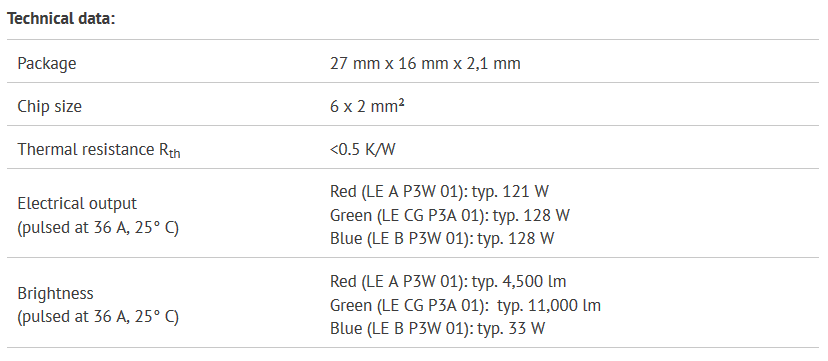 |
New LEDs from Osram enables high- output office projection for the first time. (Osram/LEDinside)
|
A smaller package but more output. The new Osram Ostar Projection Power from Osram Opto Semiconductors enables customers to equip even mainstream projectors rated at more than 2500 lumen (lm) exclusively with LED lighting for the first time. This efficient new light source is the successor to the P3W. As a monochrome LED it is available in red, converted green and blue. The new LED is based on the latest chip technology and advanced production methods.
The external dimensions of the new Osram Ostar Projection Power have been reduced to 27 mm x 16 mm x 2.1 mm and are now the same as those of the compact sister LEDs, the LED P1W and P2W. The latest UX:3 and thin-film chip technologies and production methods are also used for the new P3W 01. At 36 amps pulsed, the typical brightness is 4500 lumen (lm) for the red version, 11,000 lm for the green version and 33 W for the blue version. It hasn’t been possible before to generate such high luminous flux and radiant intensity from such a small surface area.
LED projectors now 100 times brighter than in 2005
Thanks to the new LED from Osram Opto Semiconductors, standard office projectors with luminous intensities of between 2500 and 3500 lm can now have LEDs as the sole light source for the first time. “In the past ten years the brightness of projectors equipped solely with LEDs has been increased by factor 100”, said Wolfgang Schnabel from Product Marketing LED at Osram Opto Semiconductors. “It is the result of years of research and development. Our customers have made huge progress in system development, and we have in chips and packages.”
Huge brightness, small surface
One red, one green and one blue Osram Ostar Projection Power are used as the light sources in a projector. These monochrome LEDs each consist of six chips with an area of 2 mm² operated in parallel. Osram developers are using a new type of connection between the chip and the heat sink which results in a small thermal resistance Rth of <0.5 K/W. Heat can therefore be dissipated better and the system can be operated up to its maximum output limit. The heat sinks can also be made smaller, which in turn leads to a more compact design for the projectors.
The Osram Ostar Projection Power is already available on request for first customer projects. Volume start-up is planned for the end of January 2016.





 CN
TW
EN
CN
TW
EN







